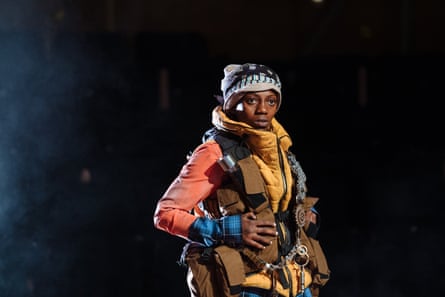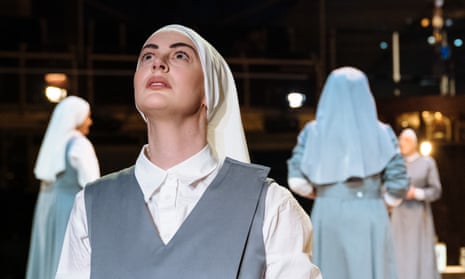Startling and audacious in its conception, Tim Foley’s play collides religion and technology, ritual and algorithms, tradition and innovation. A Bruntwood prize for playwriting winner in 2017, and only just receiving its premiere now, it is a brilliant example of what the competition should be all about.
As the play opens, St Grace’s Convent is in trouble. The mother superior has died, the coffers are almost empty and morale is low. In desperation, Elizabeth, the new acting mother, brings in Mary – a council-funded robot who divides opinion among the sisters. But could she be the miracle they all need?
Like its narrative, Foley’s play is a crucible of old and new. At its heart is a relatively traditional, character-driven comedy drama about an isolated group of women confronted with a newcomer. As played by an excellent cast, the petty squabbles and power struggles of a community facing obsolescence are all deeply believable and often very funny. But this reality is unsettled by eruptions of the strange and otherworldly, whether in the form of robotics or spirituality.

In the best sci-fi tradition, Foley limits the outlines of his near-future world to tantalising hints about altered seasons, automated workers and restless Luddites. The action stays confined to the convent, with turmoil shimmering on the horizon. The play is less concerned with the specificities of this world and more interested in what artificial intelligence means for the essential business of being human.
Director Jaz Woodcock-Stewart amplifies the wonder and intrigue of this story, maximising its ambiguities and moments of awe while drawing on the inherent theatricality of Catholicism. The robot at the drama’s centre, meanwhile, is played with uncanny precision by Breffni Holahan, who conveys Mary’s not-quite-humanness with subtle tilts of the head and eerie vocal inflections.
The great unravelling of the play’s second act, with its revelations both heavenly and human, occasionally feels overdone. There’s a lot crammed in here, between the visions seen, the secrets revealed and the outside world that starts knocking at the convent door. But it’s thrilling to see a new play of such ambition and ingenuity.

Comments (…)
Sign in or create your Guardian account to join the discussion